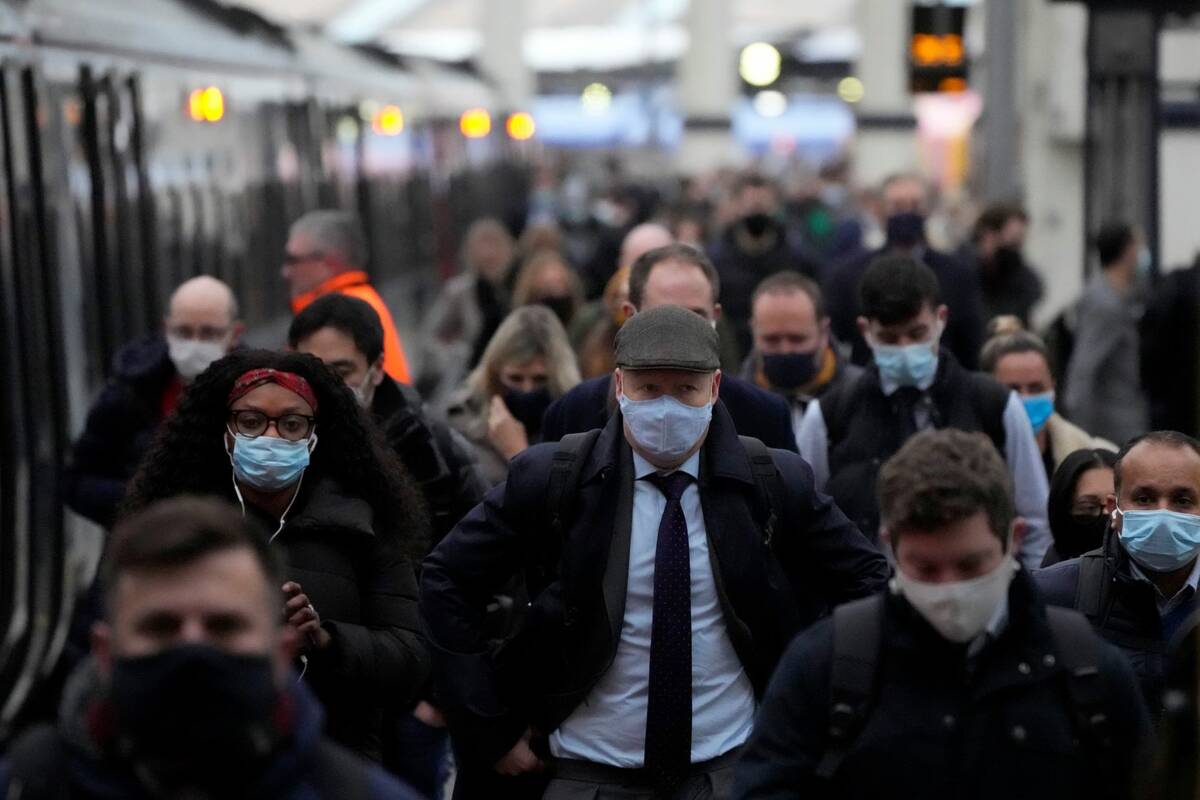Omicron is milder, better at evading vaccines, data reveals
JOHANNESBURG — The omicron variant is offering more hints about what it may have in store as it spreads around the globe: A highly transmissible virus that may cause less severe disease, and one that can be slowed — but not stopped — by today’s vaccines.
An analysis Tuesday of data from South Africa, where the new variant is driving a surge in infections, suggests the Pfizer vaccine offers less defense against infection from omicron and reduced, but still good, protection from hospitalization.
The findings are preliminary and have not been peer-reviewed — the gold standard in scientific research — but they line up with other early data about omicron’s behavior, including that it seems to be more easily spread from person to person.
The spread can be seen in Britain, the United States and Denmark, where confirmed omicron cases are increasing at a worrisome pace, said Dr. Jacob Lemieux, who monitors variants for a research collaboration led by Harvard Medical School.
“Omicron is moving extraordinarily fast, faster even than the most pessimistic among us thought it was going to move,” Lemieux said.
‘Extremely rapid kinetics’
During past waves of the pandemic, the U.S. could look to Europe and Britain for an early signal of what was coming, Lemieux said. “With omicron, it seems to be happening everywhere all at once with extremely rapid kinetics.”
It’s unclear whether omicron’s rapid spread will overwhelm hospitals. In South Africa, although case numbers are rising, hospital admissions for adults diagnosed with COVID-19 are 29% lower compared to the wave the country experienced in mid-2020, after adjusting for vaccination status, according to the new analysis.
Still, some experts cautioned that it’s too soon to draw conclusions since the variant is quite new and hospitalizations can lag weeks behind infections.
When omicron reaches broader populations more useful information will emerge, said Dr. David Dowdy, an infectious disease epidemiologist at Johns Hopkins Bloomberg School of Public Health.
“To date, omicron has disproportionately infected young adults — people who probably have more social contacts and are more likely to attend large gatherings,” Dowdy said. Young adults may be more likely to be sick without knowing it, have more intense exposures and experience milder disease, he said.
“Our society needs to learn how to wait, rather than either panicking or dismissing early findings,” Dowdy said.
U.S. health officials estimate that a small, but growing proportion of new COVID-19 infections are due to omicron, and that the rise is particularly dramatic in some places.
Two weeks ago, omicron accounted for less than 0.5% of the coronaviruses that were genetically sequenced in the U.S. That rose to about 3% last week, the Centers for Disease Control and Prevention reported Tuesday.
But it varies from place to place, and is as high as 13% in the New York/New Jersey area, according to the agency.
The CDC is tracking how fast the percentage doubles, and as more cases come in, it may be better able to predict whether — or when — the omicron variant becomes the dominant version of the coronavirus in the U.S, health officials say.
In Britain, omicron cases are doubling every two to three days. Health officials say the variant will replace delta as the dominant coronavirus strain within days.
Protection woes
In the new South Africa findings, people who received two doses of the Pfizer-BioNTech vaccine appeared to have just 33% protection against infection, compared to those who were unvaccinated, during the country’s current omicron-fueled surge, but 70% protection against hospitalization. The analysis was conducted by Discovery Health, South Africa’s largest private health insurer, and the South African Medical Research Council.
The study did not look at booster shots, which are not yet prevalent in South Africa but which data from elsewhere has indicated improves protection.
The Pfizer vaccine’s 70% protection against hospital admission during the omicron surge compares to a 93% protection level seen in South Africa’s delta-driven wave, according to the new analysis.
That’s a big drop in vaccine protection from severe illness requiring hospitalization, said Dr. Eric Topol, head of the Scripps Research Translational Institute.
“What we don’t know yet is whether the booster will restore that back to greater than 90% and for how long,” Topol said.
The analysis in South Africa was based on examining more than 211,000 COVID-19 test results that date from Sept. 1 to Dec. 7 — 41% of which were for adults who had received two doses of the Pfizer vaccine, which is the most commonly used one in South Africa.
Experts now say that omicron accounts for more than 90% of all new infections in South Africa, according to Discovery Health chief executive Dr. Ryan Noach.
Researchers around the world are rushing to figure out what the variant will mean for the coronavirus pandemic, now well into its second year. More information came Tuesday from Pfizer, which announced that its experimental pill to treat COVID-19 — separate from its vaccine — appears effective against omicron.
In the weeks since the variant was detected, South Africa has experienced rapid spread of the virus. The seven-day rolling average of daily new cases in the country rose over the past two weeks from 8.07 new cases per 100,000 people on Nov. 29 to 34.37 new cases per 100,000 people on Dec. 13, according to Johns Hopkins University. The death rate hasn’t increased during that same period.
Some say there’s still not enough data to draw broad conclusions about hospitalizations and the severity of disease caused by omicron.
“Is omicron milder, or more severe than delta?” said Dr. Michael Head, Senior Research Fellow in Global Health, University of Southampton, wrote of the study. “Time will tell. The world’s finest scientists, including many in the global south such as in South Africa, will find out. For now, national-level decision-makers have to consider that discretion is the better part of valor.”










































